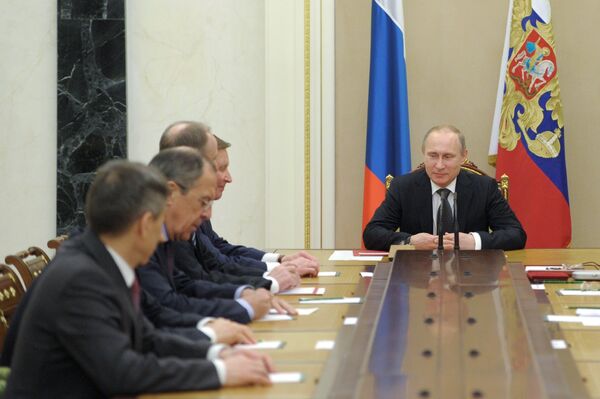MOSCOW, February 25 (RIA Novosti) – Russian President Vladimir Putin discussed the ongoing situation in Ukraine with top security officials Tuesday, his spokesman has said.
Spokesman Dmitry Peskov said the issue dominated the scheduled Security Council meeting.
Putin has so far refrained from making any public pronouncements on the unrest in Ukraine that led to the toppling of President Viktor Yanukovych at the weekend.
Officials in Russia have limited themselves to condemning events in the neighboring country as the work of “extremists” and “terrorists” and saying they cannot yet recognize the legitimacy of the incoming government.
Officials taking part in the meeting included Prime Minister Dmitry Medvedev; Foreign Minister Sergei Lavrov; Defense Minister Sergei Shoigu; Interior Minister Vladimir Kolokoltsev; Kremlin administration head Sergei Ivanov; the speakers of the lower and upper houses of parliament, Sergei Naryshkin and Valentina Matviyenko respectively; and the heads of the domestic and foreign intelligence agencies, Alexander Bortnikov and Mikhail Fradkov respectively.
Overweening Russian influence on Ukraine has been cited as a primary contributor to the anti-government protests that kept the former Soviet nation in a state of political paralysis for months on end.
The demonstrations were initially sparked by Kiev’s decision in November to back away from a deal to boost trade and political ties with the EU in favor of greater integration with Russia. Impetus was given to those protests by the authorities’ initially heavy-handed attempt to clamp down on the occupation of a square in the capital, and discontent gradually broadened to encompass calls for the government’s ouster.
Early legislative initiatives being considered by Ukraine’s parliament, where the agenda is now dominated by the erstwhile opposition, include a proposal to drop Russian as an official language. That has provoked alarm among the ethnic Russian minority in the east of the country, where Yanukovych drew much of his support, as well as expressions of concerns from Moscow.


